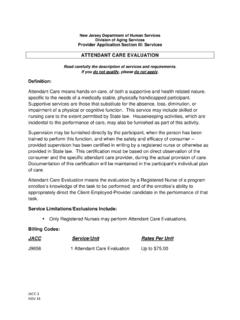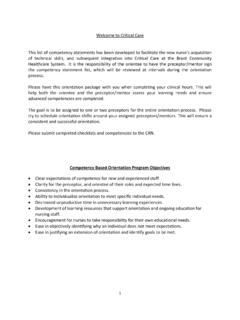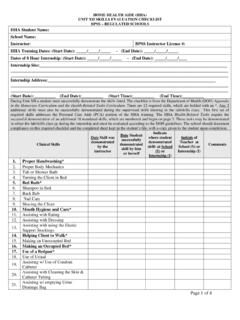Transcription of Drug Test Policy - Government of New Jersey
1 Attorney General's Law Enforcement Drug Testing Policy Revised December 2020 DRUG TESTING Attorney General's Law Enforcement Drug Testing Policy Revised December 2020 Table of Contents I. INTRODUCTION .. 1 II. APPLICABILITY .. 2 III. NOTIFICATION OF DRUG TESTING PROCEDURES .. 5 IV. SPECIMEN ACQUISITION PROCEDURES .. 6 V. SUBMISSION OF SPECIMENS FOR 11 VI. ANALYSIS OF SPECIMENS .. 11 VII. DRUG TEST RESULTS .. 12 VIII. CONSEQUENCES OF A POSITIVE TEST RESULT .. 13 IX. CONSEQUENCES OF A REFUSAL TO SUBMIT TO A DRUG TEST .. 13 X. RESIGNATION/RETIREMENT IN LIEU OF DISCIPLINARY ACTION.
2 14 XI. RECORD KEEPING .. 14 XII. CENTRAL DRUG REGISTRY .. 15 ATTACHMENTS .. 17 1 DRUG TESTING Attorney General's Law Enforcement Drug Testing Policy Revised December 2020 I. INTRODUCTION As the chief law enforcement officer of the State, the Attorney General is duty bound to ensure that the citizens of New Jersey receive police services from law enforcement officers whose competency and integrity are beyond question. The Attorney General is responsible for ensuring that the illegal use of drugs by individual law enforcement officers does not undermine the integrity of law enforcement agencies or threaten the safety and morale of other law enforcement officers.
3 This Policy supersedes the New Jersey Law Enforcement Drug Testing Manual (7/15/01) as well as prior versions of the Attorney General s Law Enforcement Drug Testing Policy (last rev. April 2018). The December 2020 revisions are intended to implement the New Jersey State Medical Examiner Toxicology Laboratory s transition to updated urine specimen collection kits and the necessary related procedures. The Policy was last revised in accordance with Attorney General Directive 2018-2 requiring the implementation of a random drug testing Policy by all state, county and municipal law enforcement agencies under the legal authority of the Attorney General.
4 It also requires the drug testing of law enforcement applicants as a condition of employment. The Division of Criminal Justice together with the New Jersey State Medical Examiner Toxicology Laboratory (the Laboratory) is responsible for coordinating the New Jersey law enforcement drug testing program. Information concerning the program may be found at the Division's website The goal of the Policy is deterring illegal drug use by law enforcement officers. The Policy provides law enforcement agencies with a mechanism to identify and remove those law enforcement officers engaged in the illegal use of drugs.
5 Because illegal drug use is inconsistent with the duties, obligations and responsibilities of sworn law enforcement officers, the Policy mandates that officers who test positive shall be terminated from employment. The Policy sets forth uniform methods and procedures for implementing and administering law enforcement drug testing. The Policy further outlines the duties and responsibilities of the State's law enforcement agencies and chief executive officers with respect to the drug testing process. Every law enforcement agency under the authority of the Attorney General must implement a drug testing program consistent with this Policy .
6 The Policy seeks to ensure that the employment rights of individual law enforcement officers are safeguarded consistent with legal principles. As a result, the Policy sets forth procedures for the uniform collection, submission and analysis of drug test specimens. The procedure further seeks to ensure the accuracy and reliability of the drug testing process. Every law enforcement agency must administer its drug testing program in a way that is fundamentally fair to individual law enforcement officers and is consistent with due process requirements and the laws of this State. 2 II. APPLICABILITY A.
7 Personnel 1. Applicants for a position as a law enforcement officer who, if appointed, will be responsible for the enforcement of the criminal laws of this State and will be authorized to carry a firearm under 2C:39-6. 2. Law enforcement officer trainees subject to the Police Training Act while they attend a mandatory basic training course. 3. Sworn law enforcement officers who are responsible for the enforcement of the criminal laws of this State, come under the jurisdiction of the Police Training Act and are authorized to carry a firearm under 2C:39-6. 4. The Law Enforcement Drug Testing Policy does not apply to civilian employees of a law enforcement agency.
8 Agencies that wish to drug test civilian employees should consult with legal counsel to establish drug testing policies and procedures consistent with human resource Policy and/or collective bargaining rights. B. Employment Status Drug testing may be categorized by the employment status of the individual being tested and the method by which the individual was selected for testing. These methods include applicant testing, trainee testing, and officer testing. Testing is required of all police applicants and trainees. Pursuant to AG Directive 2018-2, law enforcement agencies are required to implement a random drug testing program for all sworn officers in their departments.
9 Further, law enforcement agencies have an independent obligation to undertake drug testing of individual officers and trainees when there is reasonable suspicion to believe that the officer or trainee is illegally using drugs. 1. Applicant Testing The Law Enforcement Drug Testing Policy recognizes that drug testing is an important component of a pre-employment background investigation. Thus, prospective employees should be drug tested as a condition of employment. The Policy requires law enforcement agencies engaged in the hiring process to drug test prospective employees at any point during the pre-employment process.
10 In addition, applicants for employment may be tested as many times as the law enforcement agency deems necessary to ensure that the applicants are not engaged in the illegal use of drugs. For example, applicants who have been drug tested as part of the application process may be tested again if a significant amount of time has elapsed since the previous step in the employment process. During the pre-employment process, the agency must ensure that it complies with the provisions of the Americans with Disabilities Act (ADA) by refraining from making any medical inquiries. Therefore, the medication information form should not be used at the applicant stage, unless a positive test result requires an explanation by the prospective employee.















